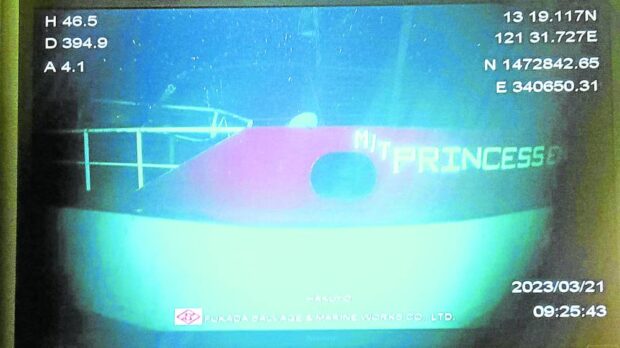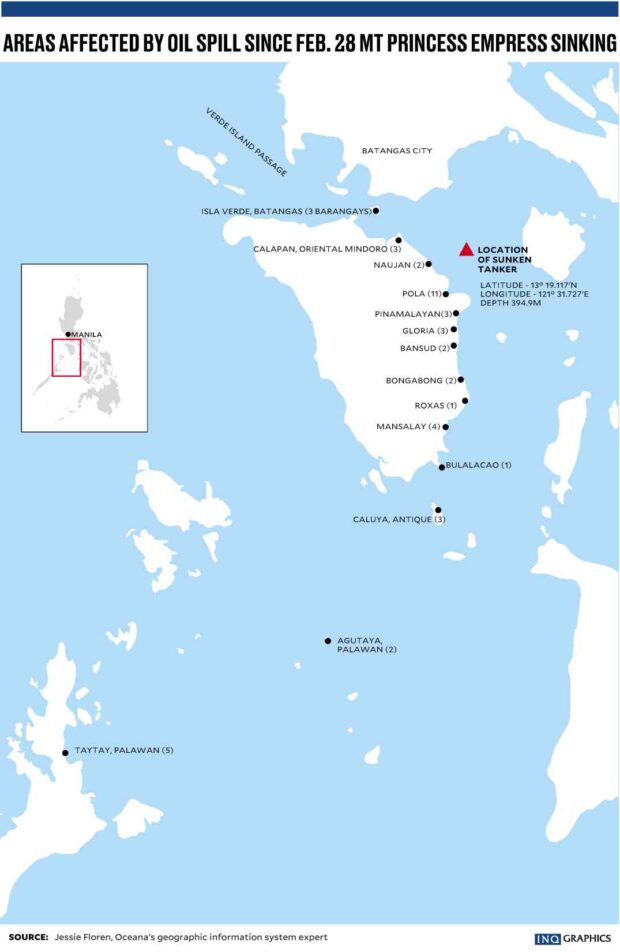Low-level contaminants found in fish in oil spill areas

LOST AND FOUND | A Japanese remotely operated underwater vehicle on Tuesday located the oil tanker MT Princess Empress at a depth of 394.9 meters in the waters between Oriental Mindoro and Marinduque. The ship continues to leak oil almost a month after it sank on Feb. 28, 2023. (Photo from the Philippine Coast Guard)
MANILA, Philippines — Low-level contaminants or polycyclic aromatic hydrocarbons, chemicals found in crude oil that are harmful to humans and other living organisms, have been found in fish samples taken from areas affected by the oil spill in Oriental Mindoro, the Bureau of Fisheries and Aquatic Resources (BFAR) reported on Tuesday.
BFAR said its preliminary findings also showed traces of petroleum products, particularly oil and grease, in the water samples it tested.
The agency has not categorically advised consumers to avoid consuming seafood from the affected locations, pending the outcome of additional examinations. But fishing activities in certain parts of the province remain suspended for public safety.
“The results of the analyses are not yet conclusive as far as food safety is concerned,” BFAR said.
It added: “Further sampling and analyses are being conducted to establish time-series results on the effect of the oil spill on fish concerning food safety, taking into account the magnitude of the oil spill which has reached neighboring areas like Caluya, Antique, and some municipalities of Palawan.”
The bureau said it “will continuously analyze water and fish samples in affected areas to monitor the possible spread of contamination and determine the extent of damage caused by the oil spill in the fishery sector.”
“Results will be shared with the public as soon as data becomes available,” it added.
Turnaround period
From March 3 to 14, BFAR took water samples from different sites and also collected fish samples from the towns of Naujan, Pola, Pinamalayan, Bansud, Gloria, Roxas, Mansalay, Bongabong and Bulalacao, all in Oriental Mindoro.
It analyzed both types of samples within the standard 10-day turnaround period for fish sample analysis, to determine contaminant levels in water and fishery resources.
The agency said it was also testing water and fish samples in Caluya, Antique, which has already declared a fishing ban.
Agriculture Assistant Secretary Rex Estoperez reiterated that the oil spill would not affect domestic fish supply due to the open fishing season.
“This won’t affect our supply because it’s open season now. We can still catch fish elsewhere,” said Estoperez, also the Department of Agriculture’s deputy spokesperson.
Criminal liability
Meanwhile, Justice Secretary Jesus Crispin Remulla said various government agencies, including the Maritime Industry Authority (Marina) and the Philippine Coast Guard (PCG), have been ordered to produce relevant documents in the investigation of the oil spill caused by the sinking of the MT Princess Empress off the waters of Oriental Mindoro.
“Subpoenas have been delivered for all the documents we need from the different agencies. We’re asking for all the documents, also records from the Philippine Ports Authority,” he told reporters.
“All the details about the oil spill we want to get into because we think there should be criminal liability here,” he added.
Remulla visited Pola, Oriental Mindoro, on Tuesday, together with other government officials, to conduct an inspection of the extent of damage brought by the oil spill.
He expressed alarm over the oil slick reaching Verde Island Passage, saying it was “very much at risk of damage.”
“It’s one of the most important areas for marine biodiversity in the world. The Verde Island Passage is very important to our country,” he added.
Fisherfolk group Pambansang Lakas ng Kilusang Mamamalakaya ng Pilipinas (Pamalakaya) on Tuesday lamented the “inadequate” response and “negligence” of the government, which it said prolonged and increased the detrimental impact of the oil spill.
“We demand a thorough, impartial, and transparent investigation of this seemingly avoidable ecological nightmare,” it said.
The incident has so far affected the livelihood of more than 19,000 fisherfolk and their families.
